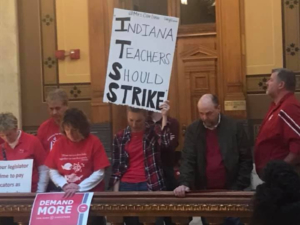
On March 20, the Indiana Senate approved House Bill 1005. The bill changes the date that the governor will appoint the State Superintendent of Public Instruction to January 2021, up from the initial date, set by a 2017 law, of January 2025. That law was passed largely in response to a shocking upset election in 2012 when Glenda Ritz became the first Democrat to win an election for a statewide office in Indiana since 1996 and the first Democrat to be elected state superintendent since the early 1970s.
Ritz’s election was strongly supported by the Indiana State Teachers Association, the state branch of the National Education Association’s teachers union, and was largely considered a referendum on preceding state superintendent Tony Bennett’s pro-privatization education agenda. Ritz’s election was an attempt by workers to work within the capitalist system to try to push back against high-stakes standardized testing and attacks on teachers, and to end the flood of public money going to private and charter schools, including religious schools that fire LGBTQ staff with little recourse.
Election results undermined
Despite receiving more votes in the election than then-Governor Mike Pence, Ritz’s ability to decide education policy for the state was quickly undercut by laws passed by the overwhelmingly Republican state legislature that stripped her of control over the state board of education while simultaneously creating an entirely unelected shadow education board that was given many of the responsibilities of the state superintendent’s office. Her office frequently sparred with Pence and the legislature over their constant stream of anti-democratic attacks on public education.
Rosa Luxemburg wrote in Reform or Revolution, “If democracy has become superfluous or annoying to the ruling class, it is on the contrary necessary and indispensable to the working class… Democracy is indispensable to the working class because only through the exercise of its democratic rights, in the struggle for democracy, can the working class become aware of its class interests and its historic task.”
The annoyance shown by the ruling class in Indiana to a single worker-supported victory in a so-called “democracy” has been extreme: the total removal of the ability of the people to elect their state education officer.
While Democrats will work over the next year to argue that only electing their candidate to lead the undemocratic state government is the way forward, workers of Indiana must fight for a democratic system in which all state officers are elected and recallable.
Real democracy
Only a socialist democracy, where workers wield state power, will fully fund public schools in all parts of the state, not just the wealthy white suburbs of Indianapolis. Only a workers’ state will end the school-to-prison pipeline exacerbated by ever-decreasing funds for nurses, librarians, band and choir teachers, extra-curricular programs and guidance counselors who have time to counsel students and not simply administer corporate standardized tests.
The lessons of the Indiana legislature’s attacks on democracy and education in the Hoosier state are clear: to protect democracy and education, Indiana workers must become aware of our historic task, and organize to build a state led by working people.






